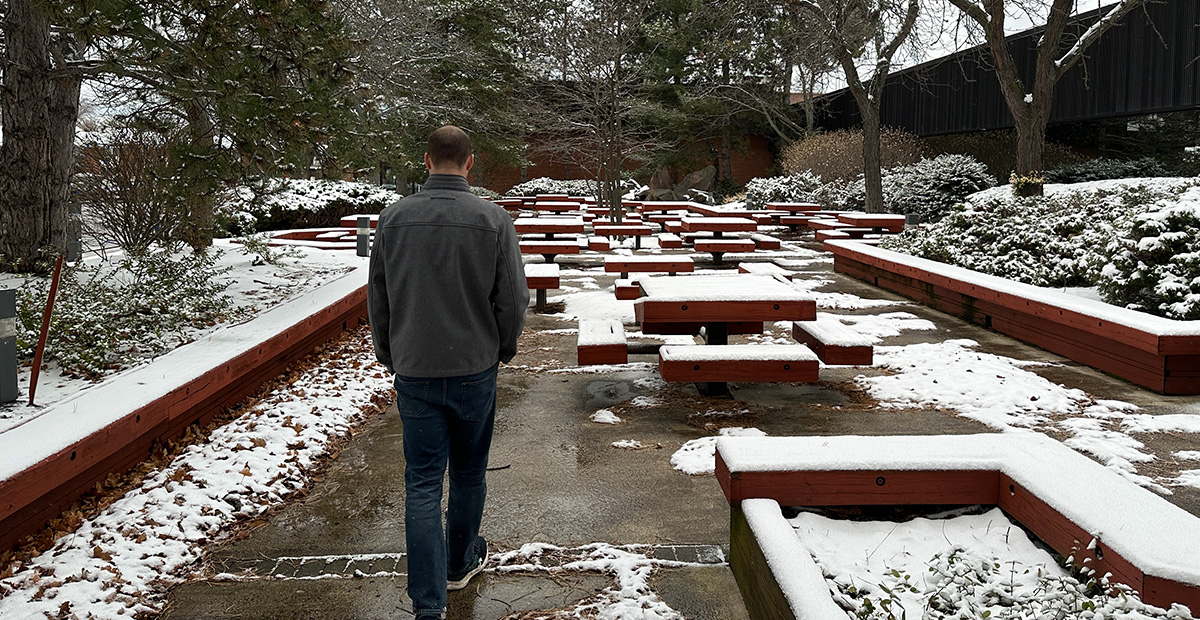The holiday season can be a time for family to come together, enjoy good food and good company, and make new memories. For some people, the same season can be a reminder of who or what they may have lost.
Scarlett Aeckerle, LMSW, is a licensed social worker with Rochester Regional Health and understands how the experience of grief or loss is different for different people.
Putting words to grief
Being able to name the feelings you are holding onto can be an important step in dealing with them. With grief, the experience is often linked to death. The American Psychiatric Association refers to it as an “intense yearning or longing” coupled with “intense sorrow and emotional pain”, and a focus on the person who died or circumstances surrounding their death.
For the people going through grief, there are several ways it happens. These can be described in four common forms:
Disenfranchised grief: This is typically goes unacknowledged or is invalidated by social norms. For example, a healthcare worker who cares for a patient for an extended period of time may not be recognized as grieving for that patient when he or she dies.
Anticipatory grief: If a person goes through this type of grief, it is in advance of a death. This will happen when a person receives a terminal diagnosis, or has physically or mentally declined over time.
Cumulative grief: Multiple losses experienced over a short period of time are described this way. When these losses compound, they can prolong the grieving process by not allowing the person experiencing the losses to properly grieve each one on its own.
Complicated grief: Often considered severe, complicated grief prevents a person from resuming their normal level of pre-grief function more than six months after the loss.
Different kinds of loss
The event that most people think of when it comes to grief and loss is the death of a loved one. Even with a reduced public stigma of speaking openly about emotions, there are other forms of loss that are not talked about quite as frequently.
Some of these losses may include:
- Hopes and dreams for the future
- Important events (i.e., weddings, graduations)
- Relationships – romantic and friendships
- Physical abilities and health
- Control and certainty over circumstances
“These are all valid events and experiences to grieve,” Aeckerle said. “While experiencing a death is widely recognized as a reason to grieve, these other losses warrant their own grief that should be recognized too.”
How people grieve
There is no ‘playbook’ for how to grieve. Each person’s experience is unique, based on their circumstances in life and cultural norms.
Generally, there are three common grieving processes related to grieving a death:
- Belief in a relationship with a person beyond their physical death
- Anger with those responsible for the death
- Setting a ‘time of mourning’
Grief can intensify feelings of connection to spiritual or religious beliefs – either drawing some people closer to their faith or pushing away from it intensely.
Families who share values and interests with one another can find comfort and purpose in the time following a loss. This can help to move forward through a loss such as a death by creating connection and trying to find meaning.
“No two people experience loss in the same way,” Aeckerle said. “Provided the person grieving is not causing harm to themselves or another person, being present – physically and emotionally – is one of the most helpful ways you can be there for them.”
Looking for support
Everyone needs to be supported when they are mourning a loss. The ways in which each person needs support and help will vary; it is important to remember that something that works for you may not work for someone else.
Here are a few ways you can be there:
Validation: Let the person know their feelings and reactions during this intense and stressful time are normal. For better or worse, death and loss are something we will all experience eventually. They are not the only ones who have gone through this.
Support groups: For some, talking with others who may be going through a similar situation can be a good step to take. If the loss or death was due to a specific illness, support groups built around that experience likely exist for them.
Allow time: Acknowledging that grief takes time is important. Grief is not linear. It cannot be rushed; it will happen on its own schedule.
Honesty: This is especially important for children. Younger children experience loss and grief differently than older children. Telling them appropriately what is happening will help them to process it properly.
Communicate: Technology allows us to speak with one another at a moment’s notice instead of waiting for a letter to arrive or someone to travel a long distance. Using video chats, text messages, and telemedicine can be a few ways you can check in on a friend or loved one during their time of grief.
There are times in which a person may show ‘red flags’ in their attempts to cope with their loss. These may include:
- Focusing on “if only” statements and ideas repeatedly
- Avoiding people or reminders of their loss or death
- Avoiding regular eating or exercise habits
- Experiencing prolonged periods of sleeping regularly
“These actions are signs that they need professional help from a therapist and/or counselor,” Aeckerle said. “If someone is exhibiting behaviors that are troubling to you and other close friends or family members, it may be time to suggest speaking with a mental health professional or trusted spiritual leader.”









